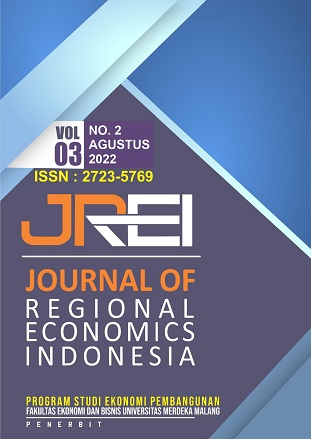Spekulasi Potensi Pajak Karbon sebagai Instrumen Sumber Pembiayaan di Indonesia
DOI:
https://doi.org/10.26905/jrei.v3i2.9051Keywords:
Pajak Karbon, Pembiayaan Berkelanjutan, LingkunganAbstract
Penelitian ini bertujuan untuk menganalisis potensi pendapatan pajak karbon di Indonesia yang akan diterapkan pada tahun 2022 mendatang. Data yang digunakan merupakan data pada periode 2000 hingga 2019 dengan menggunakan metode deskriptif kuantitatif. Hasil menunjukan produktifitas emisi karbon setiap tahunnya cenderung meningkat, hal ini dikaibatkan oleh berkembangnya berbagai sektor industri setiap tahunya, oleh sebab itu spekulasi potensi pajak karbon di Indonesia terus meningkat selasar dengan meningkatnya karbon yang dihasilkan dalam kegiatan ekonomi di Indonesia.Downloads
References
Bhat, A. A., & Mishra, P. P. (2019). Are Carbon Taxes Regressive in India? Evidence from NSSO Data. The Indian Economic Journal, 67(1–2), 30–44. https://doi.org/10.1177/0019466220941175
Eisenmann, C., Steck, F., Hedemann, L., Lenz, B., & Koller, F. (2020). Distributional effects of carbon taxation in passenger transport with lump-sum offset: low income households, retirees and families would benefit in Germany. European Transport Research Review, 12(1). https://doi.org/10.1186/s12544-020-00442-6
Geroe, S. (2019). Addressing Climate Change Through a Low-Cost, High-Impact Carbon Tax. Journal of Environment and Development, 28(1), 3–27. https://doi.org/10.1177/1070496518821152
Irama, A. B. (2019). Potensi Penerimaan Negara Dari Emisi Karbon: Langkah Optimis Mewujudkan Pembangunan Berkelanjutan Di Indonesia. Info Artha, 3(2), 133–142. https://doi.org/10.31092/jia.v3i2.585
Ratnawati, D. (2016). Carbon Tax Sebagai Alternatif Kebijakan Untuk Mengatasi Eksternalitas Negatif Emisi Karbon di Indonesia. Indonesian Treasury Review Jurnal Perbendaharaan Keuangan Negara Dan Kebijakan Publik, 1(2), 53–67. https://doi.org/10.33105/itrev.v1i2.51
Saputra, A. I. (2021). Pajak Karbon Sebagai Sumber Penerimaan Negara dan Sistem Pemungutannya - Carbon Tax as a Source of State Revenue and Its Collection System. Jurnal Anggaran Dan Keuangan Negara Indonesia, 3(1). https://anggaran.e-journal.id/akurasi
Selvi, Rahmi, N., & Rachmatulloh, I. (2020). Urgensi Penerapan Pajak Karbon di Indonesia. Jurnal Reformasi Administrasi, 7(1), 29–34. https://ojs.stiami.ac.id/index.php/reformasi/article/view/845
Takeda, S., & Arimura, T. H. (2021). A computable general equilibrium analysis of environmental tax reform in Japan with a forward-looking dynamic model. Sustainability Science, 16(2), 503–521. https://doi.org/10.1007/s11625-021-00903-4
Warsito, A., Darussalam, A., Putri, E., Pradana, L., Priyono, J., & Padjadjaran, U. (2020). TAX IMPLEMENTATION DESIGN ON EXCESSIVE WASTE RELATED TO THE. 16(1), 1–9.
Wong, K. Y., Chuah, J. H., & Hope, C. (2019). As an emerging economy, should Malaysia adopt carbon taxation? Energy and Environment, 30(1), 91–108. https://doi.org/10.1177/0958305X18787273
Downloads
Published
Issue
Section
License
License JREI: Journal of Regional Economics Indonesia, University of Merdeka Malang is licensed under Creative Commons Attribution Attribution-NonCommercial-NoDerivatives 4.0 International License.
JREI: Journal of Regional Economics Indonesia, University of Merdeka Malang is licensed under Creative Commons Attribution Attribution-NonCommercial-NoDerivatives 4.0 International License.
Copyright
Authors who publish with this journal agree to the following terms:
- Authors retain copyright and grant the journal right of first publication with the work simultaneously licensed under a Creative Commons Attribution Attribution-NonCommercial-NoDerivatives 4.0 International License that allows others to share the work with an acknowledgment of the work's authorship and initial publication in this journal.
- Authors are able to enter into separate, additional contractual arrangements for the non-exclusive distribution of the journal's published version of the work (e.g., post it to an institutional repository or publish it in a book), with an acknowledgment of its initial publication in this journal.
- Authors are permitted and encouraged to post their work online (e.g., in institutional repositories or on their website) before and during the submission process, as it can lead to productive exchanges and earlier and greater citation of published work (See The Effect of Open Access).




